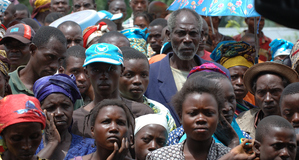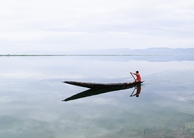Cobalt, Computation, and the Congo: Making Corporations Pay for Their Transnational Terrors
By
2020, Vol. 12 No. 09 | pg. 1/1
IN THIS ARTICLE
Though electronic products are ubiquitous in the modern Western world, most people are not aware of the origins of the batteries that power devices such as laptop computers and mobile phones. Lithium-ion batteries, though used primarily in wealthy and affluent nations like the United States, include the element cobalt, a mineral mined primarily out of the Democratic Republic of the Congo (Lenntech). Despite the fact that the technologies supported by cobalt have greatly enhanced the lives of affluent Western technological consumers, the mining of cobalt has wreaked havoc on many Congolese communities. Cobalt mining within the Democratic Republic of the Congo (DRC) has created many negative lived experiences for the local populations it involves, ranging from exploitative and hazardous child labor to poor water quality resulting from toxic mine drainage (Sadof, Mucha and Frankel). If these issues related to Congolese cobalt mining are not addressed now, countless lives will continue to be ruined in the DRC for the sake of consumption in the global North. This report suggests that states housing transnational corporations that create these technologies, such as the United States and the UK, take immediate action and implement policies similar to those discussed throughout this report. Though the details of our suggested policies will be discussed later, they can be summarized as follows: first, we must require that states hold their corporations responsible for ensuring more equitable and sustainable conditions within the cobalt mines they utilize, including specific requirements regarding issues such as child labor, low mining wages, and excessive soil acidification within cobalt mining lands. Second, states must hold their corporations responsible for evaluating and meeting the needs expressed not by Western evaluators of the DRC but rather by the people of the DRC itself through a system of what we call “Local Wellness Indicators.” These states must use their administrative power to fine corporations that fail to demonstrate improvement in the lives of the employees of these cobalt mines, thus making sustainable practices more profitable for those directly working in the local extraction industries. The Reality of Cobalt Mining in the DRCThe production cycles of many popular technological products consumed at high rates in the affluent global North begin in the global South, where hazardous working conditions and environmentally unsustainable practices are common. Here, key raw materials are mined and extracted from the local land by large and powerful transnational corporations, robbing local populations of both the usage of their land and thus of their previous, and typically far more environmentally sustainable, ways of life. This is especially true in the case of cobalt. Cobalt is a valuable material for technological products in that it is a key component of quick charging lithium-ion batteries, which are preferred by consumers due to the fact that they are “comparatively low maintenance…do not require scheduled cycling to maintain their battery life” (University of Washington). Mining for cobalt occurs in many different countries, including China, Zambia, and Russia; however, no country comes close to meeting the extremely high quantity of cobalt exported each year from mines in the DRC (Lenntech).In the DRC, an extraordinary amount of cobalt is mined every day. This mining occurs for the most part within artisan mines, in which laborers mine with their bare hands, provided with little to no protective gear and forced to work in an environment mostly void of basic safety provisions or supervision (Kara). It is also significant to note that many of these workers are young children, who are forced to work under these conditions due to both the economic impoverishment experienced by the DRC as a whole and the ever-increasing demand for technological products in markets within the affluent global North. Mining occurs for the most part with laborers using their bare hands, with little or no protective gear and in an environment void of basic safety precautions. Many of these workers are young children. The process of cobalt mining thus has a great cost for the social and environmental lives of those living within and near these mining communities in the DRC. Cobalt miners, with so little physical protection, are exposed to high levels of toxic metals that “appear to be linked to ailments that include breathing problems and birth defects,” contributing to local health issues in both the long and the short term. Further, even if these miners avoid dying from toxic poisoning, simply working in these dangerous mines without any protective clothing, outer gear, or occupational safety provisions makes deaths and injuries common tragedies in the daily lives of miners (Frankel). Cobalt mining, however, does not only affect those who work directly in the mines; instead, toxic metal waste from these mines has a very negative impact on the local environment, polluting local waterways and soil and thus contributing to extensive and long-lasting degradation of land once used to support local communities and provide them with food security (Sadof, Mucha and Frankel). Problems such as acid mine drainage are constantly contributing to long-term pollution, creating water and food shortages in local areas and forcing local populations to deal with this problem with little to no support from the corporations that employ them. In short, the land and the bodies upon which these cobalt mines are constructed, overwhelmingly within the DRC, are heavily degraded by the mining industry, thus forcing upon local populations issues such as soil infertility, toxic water pollution, broad illness and injury, and economic exploitation. There thus emerges a huge problem in need of a powerful global solution: the global North, its consumers, and its corporations are benefitting and profiting every day from the suffering of individuals in Congolese cobalt mines. Nobody is being held responsible for empowering these local voices in the DRC and meeting their environmental and economic needs. Additionally, as the rates of Western consumption of technological products increase, the demand for cobalt only increases as well, placing even more stress on Congolese mines and inevitably leading to even more hazardous working conditions in order to meet this demand in the future. The local communities of the DRC are exploited daily, receiving none of the benefit for their labor and instead being forced to bear the cost of the negative externalities of lithium-ion battery production. A very small quantity of the products created with this cobalt are able to be consumed by exploited miners in the DRC; rather, the list of countries with the highest percentages of households possessing one or more laptops includes primarily wealthy nations like the United States, the United Kingdom, and Canada (The World Bank). Citizens of the global South, who extract minerals needed to produce these products (including the DRC), rarely get the chance to consume the products of their labor. Transnational corporations and their home states must accept responsibility for the pain they have caused in order to benefit their own citizens at the cost of those living in distant nations, and they must provide fiscal and technological support in order to reverse current disempowerment of DRC miners and prevent further damage. Though creating a relationship of responsibility between Western corporations and sites of raw material extraction in the global South will not be an easy or a quick process, it is a necessary part of the long process through which globally affluent and historically colonizing nations must economically pay for the damages they have enacted in the global South and work towards enfranchising and empowering those they have historically delegitimized. The policy outlined within this report, though certainly not able on its own to create a perfect relationship between local cobalt miners in the DRC and the affluent owners of Western corporations, is an essential and clear step towards completing this process and towards improving labor and land conditions in the DRC. Policy Solutions to Mitigate the Environmental and Social Costs of Cobalt MiningOur suggested solution proposes a policy that is two-pronged. The primary portion of this proposed policy addresses the creation of a long-term system in which environmental and social improvements that must be made in the Congolese mining industry are determined by local actors and must be addressed at the cost of the corporations that utilize these mines. The secondary portion of the policy outlines key improvements that must be made in the DRC immediately, at the cost of the corporations that produce technologies that utilize lithium-ion batteries derived from Congolese cobalt. Both parts of the proposed policy together aim to create a radically more sustainable system of cobalt extraction and thus mitigate some of the more extreme existing harms occurring at these local mining sites. Policy Proposal: Part OneThe primary component of our suggested policy begins with the assessment of the problem itself. Currently, global knowledge about environmental and social conditions within so-called underdeveloped nations like the DRC is dominated by economic and Western hegemons such as the World Bank, who deprive local populations in the global South (including mining populations in the DRC) of the agency of being able to describe their own conditions and make demands for the improvement of their own local communities(Goldman). Our policy therefore acts from the assumption that it is not enough to understand the social and environmental ills of mining in the DRC through the lens of a foreign Western agent; rather, we must be sure to see and understand the issues associated with mining through the lens of those who most directly interact and deal with them. We can discuss negative externalities for an eternity, but we as the Western academic elite do not truly understand the experience of actually living through these externalities and becoming incorporated within them as exploited laborers and citizens of the disenfranchised global South. Because of this, the first major component of our proposed policy is the institution of a new system of knowledge production regarding mining communities in the DRC. States such as the United States and the United Kingdom, in which companies that produce and distribute products that utilize Congolese cobalt (such as Apple and IBM) are created, that adopt our policy will be required to implement a new obligation for the corporations they house. These corporations will essentially be required by their home states to create an accountability system in which they financially compensate local agents, including DRC citizens that live near, work within, or interact with land impacted by the mining industry, in exchange for information regarding their lived experiences with regards to the mining industry. They will essentially be paid by the corporations that contract their labor and impact their communities through mining to indicate to these corporations the ways in which they live and experience the impacts of mining, enfranchising them with the power to express in their own voice the ways in which they have been harmed by cobalt mining. The information requested from these local individuals will aim to cover a wide variety of potential issues, such as water quality, employment conditions, and general equity within the mining industry. The local actors will be asked about their quality of life as it relates socially, economically, and environmentally to the presence of cobalt mines in their communities. Workers and community members alike will thus have a chance to determine which issues are most important to them, and to voice their concerns to corporations that would often rather listen to Western consumers than to the workers they so frequently exploit. These reports, from this point on referred to as Local Wellness Indicators, will be potentially submitted in a variety of ways, depending on the preference of the local populations: they can be spoken to a corporate-provided translator, written by hand, or submitted electronically. Regardless, those supplying this vital information will be compensated financially. Additionally, these Local Wellness Indicators will not just sit stagnant in an office. Rather, they will be analyzed and utilized as indicators of the problems that are in pressing need of solution within the DRC and will thus serve as the basis upon which states, such as the United States, will utilize our policy to hold certain corporations responsible for making improvements. Essentially, problems associated with the mining industry that are frequently evoked within these reports will be problems that the state will then hold corporations accountable for improving upon. The state will then enforce a timeline, proposed here to be a ten-year time period, in which the corporation will be required to use their own financial resources to mediate the problems indicated by local populations. Additionally, corporations will be required to financially support these mining communities as these transitions and changes occur, working with local mining companies and local miners to implement change while maintaining the employment and economic agency of local peoples. After the ten-year time period has elapsed, another round of Local Wellness Indicators will be collected, and if local peoples cannot identify any signs of improvement related to the problems that were supposed to be addressed within this period, the corporations in charge will be fined heavily by their home states, with fines increasing for each period in which conditions in the DRC do not improve or previous improvement is not maintained. Though it may seem illogical to attempt to solve a problem associated with the transnational production of technological commodities with nation-state level policy, this decision is entirely intentional. Primarily, it places the pressure for improved conditions within globalized sites of extraction on the wealthy and affluent nations of the global North, who in reality have caused most of this harmful extraction historically through colonialism and through the recent creation of corporations that utilize the land and labor of the impoverished global South for their own production and profit(Rodney). Additionally, this policy should be carried out at the level of the nation-state due to the fact that international governance surrounding issues of sustainability and exploitative global commerce has, by and large, proved unsuccessful, resulting in what some academic professionals refer to as the “paradox of environmental multilateralism” (Christoff and Eckersley, 127). This paradox refers to the fact that despite a rising number of international agreements and governance regarding sustainability emerging in recent years, many of the gravest environmental and social issues, such as climate change, have only worsened (Christoff and Eckersley). Thus, the level of the nation state proves to be superior to international governance in that it is closer to the people and corporations it governs and thus more able to hold these parties accountable for their participation with policy; the state, therefore, is small enough to make meaningful change in ways not possible at the international scale, but not so small that it has no administrative or punishing power over those it seeks to govern. Overall, in providing local populations with an institutionally recognized voice through the implementation of Local Wellness Indicator systems, states are able to enfranchise them in ways that currently seem impossible, creating a model for increasing local sustainability that is just and equitable for all involved parties. These people, currently exploited by foreign corporations for their labor and rendered voiceless, will automatically become recognized through the process of administering Local Wellness Indicators, and will be fairly financially compensated for the important insights they could provide. This long-term policy will also create a more equitable mechanism of understanding progress in terms of social and environmental ills surrounding cobalt mining; by ensuring that local members of mining communities in the DRC are the people who determine whether or not the corporations that utilize their products have made meaningful improvements to the social and environmental sustainability of their lives, the Local Wellness Indicator system can create a more equitable global economy in which corporations and local communities have equal say in what it means to be truly sustainable. This is especially important given that indigenous communities have been shown within multiple case studies, such as that of the Oneida Tribe in Wisconsin and the Shimshal Nature Trust in Pakistan, to possess nuanced knowledge of the natural world within their local communities. This indicates that they have a much more accurate point of view regarding the needs of their local lands and thus much greater ability to create and envision sustainability in their own local context than any foreign corporation or global governance institution (Ali; Griffin). This is exactly why it is so vital that we shift our source of knowledge regarding sustainability in the DRC, using the Local Wellness Indicators, to the indigenous peoples who have actually historically lived there, rather than relying on institutions with more global legitimacy such as the World Bank or the International Monetary Fund. By incorporating this primary policy proposal into their national bodies of legislation, states clearly have the ability to learn from indigenous and local understandings of the environmental and social contexts in which cobalt mining occurs. They have the ability to enfranchise and elevate these historically marginalized voices, creating a more equitable and just production of knowledge regarding the assessment of both current issues regarding mining but also of any progress that will follow from this point onwards. Finally, they have the ability to use their global administrative power and the logics of capitalism, economic growth, and profit valorization that so heavily influence and drive corporations that utilize cobalt in order to fiscally discipline and hold these corporations accountable to those whose labor they utilize. The state has the potential to elevate local populations in the DRC to the same level of negotiating power as corporations regarding mining practices within their own communities, as opposed to the current state of affairs, in which the economic interests of corporations and their shareholders trump all other concerns. States can essentially use the pressures of the free market, so often seen as at odds with local labor and environmental rights, to make sustainable business practices more profitable than environmental degradation and thus create more sustainable conditions abroad. Therefore, the proposed policy provides an excellent opportunity for states to take a firm stance regarding environmental and social regulations at all levels of the lifecycles of the products their corporations produce and sell, creating more sustainable societies at home and abroad whilst still respecting the rights of their corporations to exist and practice business. Policy Proposal: Part TwoWithin the first part of this policy proposal, a system is established in which Western corporations will bear the brunt of the responsibility for obtaining information about and providing improvements to conditions of environmental and economic sustainability related to cobalt mining within the DRC. Though it is vital that this long-term system of responsibility be established, there are also some dire, immediate needs that must be met with more direct-action oriented goals in the short-term in order to prevent the perpetuation of certain glaring issues of injustice and extreme harm in the DRC. These issues must be fixed now, at the expense of the corporations that have created them, in addition to the longer term and more radical goals expressed in the first part of this recommended policy(Manning and Reinecke). To ensure that these policies are followed, corporations again will be held fiscally responsible by their representative nations. If they do not, after an initial ten-year period after the institution of this policy, demonstrate commitment to or completely satisfied completion of the following three direct goals, they will be fined heavily by their states and thus punished monetarily until they make efforts to enact the below described changes. First, before any long-term solutions are fully enacted and implemented, it is vital that child labor within cobalt mines in the DRC cease immediately. This is a dire issue in that children in the DRC, being the bearers of the future of their nations, are currently prevented from being able to go to school and are instead faced everyday with hazardous health conditions within mines that could impact them for the rest of their lives. This is not a small and isolated issue, either; in fact, according to UNICEF, almost 40,000 children work within cobalt mines in the DRC. Children are converted into wage laborers due to the fact that the income paid to miners is so incredibly low (most workers earn less than two dollars for 24 hours of mine labor), families need more laborers than adult bodies can provide in order to survive economically(Cascais). Thus, because of the maltreatment and low pay of mining laborers, local families in the DRC are forced to send their children to work instead of school, leading to a long-term limiting of life opportunities due to a lack of schooling and good health. Further, studies have shown that by eliminating child labor and allowing children to attend school with their newfound free time, they not only receive the enriching experience of a full education but also are provided with higher average wages throughout their lives (Dorman). This is thus clearly a problem that, if solved now, can create opportunities for improved economic empowerment within the youngest generation of the cobalt community in the DRC. Because of this, states that adopt the policy advised in this report will be obligated to enforce upon their cobalt-using corporations a policy of zero-tolerance for child labor. Corporations will be imbued with the responsibility of ensuring that the mines that supply them do not permit or use child labor in any way. This, however, cannot simply manifest as solely an immediate moratorium on child labor and all associated activities; rather, it must also be accompanied by economic aid from corporations to create a just and equitable transition away from current economic patterns that rely on child labor. If we were to simply end child labor without providing economic support to deal with the loss of additional income that is generated by these child laborers, we would create conditions that do not meet the framework of a “just transition,” in which local workers and their economic and social needs regarding their employment are considered to be paramount in the transition from one mode of economic existence to another (Stevis). This is intimately interrelated to another condition that is asserted within this policy as a necessary change in the immediate, short-term period: the increase of hourly pay for mining laborers to a significantly higher rate at fifteen dollars per hour. Though some critics of this higher minimum wage claim that paying workers a higher amount will contribute to job loss in the local community, in many localities where a higher minimum wage has been implemented (New Jersey, for example), there have been little to no negative employment effects; in fact, these communities have actually seen increased business earnings and local consumer participation within the economy(Rodgers and Novello). If local mining companies are currently unable to pay their employees at this rate, corporations will be expected to subsidize these payments until local employers find themselves able to meet this new minimum wage. By forcing corporations to only utilize mine labor that exists at this new, heightened minimum wage, states have the potential not only to economically empower citizens within mining communities of the DRC but to also provide transition funds so that, when transitioning to a system in which child labor no longer exists, families are not forced to sacrifice their economic survival in order to send their children to school rather than to work. Thus, by putting the responsibility for improving labor conditions, through an end to child labor and an increase in the minimum mining wage in the DRC, on large corporations that produce and sell technological products that utilize cobalt rather than on local peoples, states that adopt this policy can create a more equitable system of transnational economics and support local communities as they navigate to systems of increased labor rights and equity. In addition to ensuring and providing transition funding for the creation of cobalt mining that is free of child labor and that ensures a minimum wage of at least fifteen United States dollars per hour of work, states that adopt our policy must also take action to ensure that their corporations address one of the most pressing environmental issues related to Congolese cobalt mining: soil and water contamination in areas surrounding active and abandoned mines, in which toxic metals are concentrated and thus pose threats to the health of local populations and environments. Though this is a large problem that will rely on the relationships of responsibility described in part one of this policy proposal to be fully improved, there are ways in which these conditions can and must be mitigated by corporations in the short term. Abandoned mines are meaningful sites at which this early form of restoration can occur in that these sites have been scientifically shown to contain an abundance of toxic metals yet are not currently being used directly for economic mining activity (Atibu, Lacroix and Sivalingam). Corporations, under the policy advised by this report, will thus be required to initiate reclamation efforts regarding abandoned Congolese cobalt mines, and will be legally obligated to take into account community input regarding this process. Though there are many mechanisms through which environmental reclamation of former mine land can occur, our suggested environmental actions are derived from case studies of successful land reclamation within former AngloGold mines in Ghana (Tetteh and Vincent). These studies have made it clear that in order to successfully reclaim former artisanal mines, such as cobalt mines in the DRC, it is necessary to, among other things, engage in a process of rehabilitative tree planting. Corporations will thus, under our policy, be advised to economically compensate local experts to engage in this process of tree planting, in which certain leguminous trees that have the “ability to rehabilitate degraded land by improving the physical, chemical and biological characteristics of soil,” will be planted to restore the soil to a less toxic state (Tetteh and Vincent 83). This will allow for a local reclamation of abandoned mining lands, which were likely once utilized by indigenous communities before being seized by transnational corporations for mineral extraction. This process, as part of overall reclamation efforts that will be initiated by corporations utilizing Congolese cobalt, has the potential to both restore the land of abandoned cobalt mines in the DRC to its indigenous owners and also mitigate some of the negative health impacts that have resulted from soil acidification in DRC mining lands. ConclusionOverall, it is abundantly clear that mining of cobalt in the DRC serves the needs of Western corporations and consumers of technological products at the cost of local mining employees and communities. These communities cannot experience any of the benefits of their labor; rather, they are given low wages, forced to work in hazardous conditions from childhood, and left to bear alone the cost of mining damage to their local physical environment. As discussed previously, the cobalt mining industry has had a terrible impact on many communities in the DRC, creating disastrous environmental and health conditions and creating a local economy in which the norm for employment is hazardous, unprotected work with extremely low wages and almost no negotiating power within the larger chains of production that are maintained by products extracted in the DRC. Our policy is thus not merely a suggestion, but an imperative. It has the ability, if adopted and enforced by wealthy Western states, to solve both some of the most pressing, immediate, and on-the-ground problems associated with mining the DRC (including child labor, soil acidification, and low wages) while also creating more long-term and substantial systems of responsibility and accountability that hold excessively wealthy Western corporations responsible for the lived experiences associated with their products at all stages of their creation, not just consumption. It is understandable that some may be skeptical of our plan, and that they may think that it places an undue financial burden on Western corporations. This, however, is not true: these corporations are extremely wealthy, with Apple reaching a value of one trillion dollars in 2018 (Monica). Clearly, these corporations have the money. Our policy simply forces them to redistribute it towards the members of their products’ production chains that have been exploited for the purpose of allowing for this completely unreasonable wealth accumulation. This policy plan thus has the potential to begin the long and complex process of global wealth and land redistribution, forcing the societies and corporations of the global North that have historically and colonially benefitted from the exploitation of “undeveloped” lands, like the DRC, to pay for the negative effects their consumption has caused. Our policy will create a global economy of mineral extraction that is experienced locally in a far more sustainable way, and through mechanisms of economic empowerment such as the increase in minimum wage, will create a sustainability that is available to both all countries involved in the production and consumption of technological products and to all people within local communities involved in the production of these same products. It is time to create a sustainable solution to the global exploitation of miners in the DRC that is not just environmentally friendly, but also just and equitable. Our policy can make this happen, if only countries are willing to make the commitment and force their corporations to redistribute the excessive power and wealth they have seized and end the terrible current exploitation of peoples in the global South. ReferencesAli, Nosheen. "Re-Imagining the Nature of Development: Biodiversity Conservation and Pastoral Visions in the Northern Areas, Pakistan." Contesting Development: Critical Struggles for Social Change. New York: Routledge, 2010. 64-80. Atibu, Emmanuel, et al. "High Contamination in the Areas Surrounding Abandoned Mines and Mining Activities: An Impact Assessment of the Dilala, Luilu and Mpingiri Rivers, Democratic Republic of the Congo." Chemosphere (2018): 1008-1020. Cascais, Antonio. "DW." 6 November 2017. Child Labor Still Rife in Democratic Republic of Congo. 28 April 2019. Christoff, Peter and Robyn Eckersley. "Governing the Planet." Globalization and the Environment. Lanham: Bowman & Littlefield Publishers, Inc., 2013. 125-158. Dorman, Peter. Investing in Every Child: An Economic Study of the Costs and Benefits of Eliminating Child Labour. Geneva: ILO International Programme on the Elimination of Child Labour, 2003. Frankel, Todd. "The Cobalt Pipeline: Tracing the Path from Deadly Hand-Dug Mines in Congo to Consumers’ Phones and Laptops." 30 September 2016. The Washington Post. 21 February 2019. Goldman, Michael. Imperial Nature: The World Bank and Struggles for Social Justice in the Age of Globalization. New Haven: Yale University Press, 2005. Griffin, Rory. “Indigenous Knowledge for Sustainable Development: Case Studies of Three Indigenous Tribes of Wisconsin.” University of Wisconsin, 2009. Kara, Siddharth. "Is Your Phone Tainted by the Misery of the 35,000 Children in Congo's Mines?" 12 October 2018. The Guardian. 28 April 2019. Lenntech. "Cobalt- Co." 2019. Lenntech Water Treatment Solutions. 20 February 2019. Manning, Stephan and Juliane Reinecke. "We’re Failing to Solve the World’s ‘Wicked Problems.’ Here’s a Better Approach." 2 October 2016. The Conversation. 29 April 2019. Monica, Paul La. "Apple Reaches $1,000,000,000,000 Value." 2 August 2018. CNN Business. 1 May 2019. Rodgers, William and Amanda Novello. "Making the Economic Case for a $15 Minimum Wage." 28 January 2019. The Century Foundation. 30 April 2019. Rodney, Walter. "How Europe Underdeveloped Africa." Broad, Robin. Global Backlash: Citizen Initiatives for a Just World Economy. New York: Rowman and Littlefield Publishers, Inc. , 2002. 77-79. Sadof, Karly Domb, Lena Mucha and Todd Frankel. "The Hidden Costs of Cobalt Mining." 28 February 2018. The Washington Post. 21 February 2019. Stevis, Dimitris. "(Re)Claiming Just Transition." 13 April 2018. Medium. 29 April 2019. Tetteh, Erasmus Narteh and Logah Vincent. "Adopted Practices for Mined Land Reclamation in Ghana: A Case Study of Anglogold Ashanti Iduapriem Mine Ltd." Journal of Science and Technology (2015): 77-88. The World Bank. "Households W/ Personal Computer, % Households." 2016. TCdata360. 21 February 2019. University of Washington. "Lithium Ion Battery." 2019. Clean Energy Institute. 23 February 2019. Suggested Reading from Inquiries Journal
Inquiries Journal provides undergraduate and graduate students around the world a platform for the wide dissemination of academic work over a range of core disciplines. Representing the work of students from hundreds of institutions around the globe, Inquiries Journal's large database of academic articles is completely free. Learn more | Blog | Submit Latest in Environmental Studies |














